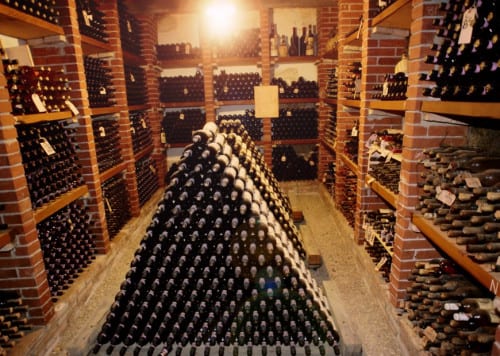WINE aged in a cupboard at home could be a big disappointment when you come to drink it, according to new research.
Scientists claim cupboard-stored wines age four times more quickly than those stored in a professional cellar.
Premium wines stored improperly at home could be a big waste of money.
After two years, wines stored in domestic conditions aged more quickly and had fewer antioxidants, less red pigmentation and a weaker flavour.
Fulvio Mattivi, of the Italian wine academy the Edmund Mach Foundation, said: “People think, ‘this is the year my daughter was born – I’ll buy a bottle and save it for ages’. It’s not a good idea.”
But he added that, for those without a wine cellar, a wine fridge could be a viable option.
“For 30 bottles you can get something very small – around the size of a washing machine.”
Wine is one of the few commodities that can improve with age but it can also rapidly deteriorate if kept in inadequate conditions.
The three factors that have the most direct impact on a wine’s condition are light, humidity and temperature.
Humidity is important to stop the corks from drying out, while light can quickly damage a wine.
Temperature however is the most important factor in wine ageing.
If the wine is exposed to too high a temperature (in excess of 25 °C) for long periods of time, it may become spoilt or ‘cooked’ and develop off flavors that taste raisiny or stewed.
YOUR WINE AGEING GUIDE TO TEMPERATURE
In general, a wine has a greater potential to develop complexity and a more aromatic bouquet if it is allowed to age slowly in a relatively cool environment.
The lower the temperature, the more slowly a wine develops.
On average, the rate of chemical reactions in wine doubles with each 8 degrees centigrade increase.
Most wine experts recommend storing wines in constant temperatures of between 9 and 15 °C. However wine can be stored at temperatures as high as 21 °C without long-term negative effect. The key is keeping the temperature constant.
Professor Cornelius Ough of the University of California believes that wine can be exposed to temperatures as high as 120 °F (49 °C) for a few hours and not be damaged.
Other wine experts say that the most important thing when storing wines is consistent temperature, but never over 18 degrees.
The most important thing is to avoid sudden ups and downs of temperature. So if you have a cellar or inside room, or cupboard, that is around 15/16 in winter and 20 in summer, but the rising of temperature is gradual you should be fine.









interesting article
If you ever wondered why Spanish bars serve up chilled red in the summer, wonder no more. One of the areas where Spain is many times better than back home. You can get a good red (Rioja or Ribero del duero) for around 2 euros – and with a free aperitivo/tapa in many places. Back home (certainly in London) you pay £5 or more for a decent glass.